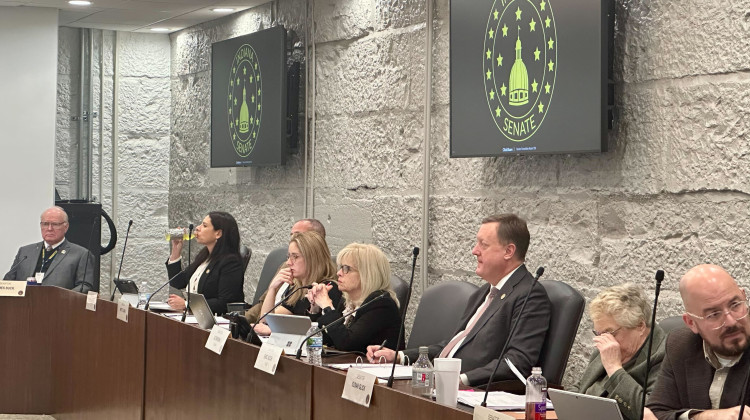
The Senate Judiciary Committee hears testimony on Senate Bill 289 on Jan. 22. The bill would would prohibit K-12 schools from teaching or promoting to students that “one race, sex, ethnicity, religion, or national origin is inherently superior or inferior to another,” among other measures.
Rachel Fradette / WFYIHave a news tip for WFYI's education team? Share it here.
Two Republican-sponsored bills would restrict how schools teach about and discuss issues like race, sexual orientation and gender in Indiana classrooms.
Senate Bill 289 would prohibit K-12 schools from teaching or promoting to students that “one race, sex, ethnicity, religion, or national origin is inherently superior or inferior to another,” among other measures.
Similarly, Senate Bill 235 restricts state educational institutions and other agencies from running diversity, equity and inclusion programs. The bill bars state funding from going to any institution that promotes or requires any DEI training.
Following five hours of discussion and testimony, both bills passed out of the Senate Judiciary Committee Wednesday.
Sens. Gary Byrne (R-Byrneville) and Tyler Johnson (R-Leo) co-authored both pieces of legislation.
The legislation follows on the heels of an executive order signed by Gov. Mike Braun that effectively banned DEI initiatives in state government. Byrne said Braun’s action and a recent U.S. Supreme Court ruling that reversed affirmative action inspired his legislation.
What would these bills do?
SB 289 would ban schools from compelling students to adopt or adhere to certain beliefs, and from hiring outside contractors to promote certain beliefs, and prohibits the endorsement of stereotypes.
It also bars schools from blaming students for historical actions committed by members of the same race, sex, ethnicity, religious or national origin.
And it would require school corporations and charter schools to publicly post certain training and curricula materials regarding diversity, equity, inclusion, race, ethnicity, sex and bias on their websites.
Byrne said the bill prohibits “any stereotype or generalizations based on race, sex, ethnicity, religion or national origin.”
“Instead, people should be respected based on their own unique character characteristics, life skills and experiences,” Byrne told the Senate Judiciary Committee Wednesday.
Byrne cited the “Eyes on Education” portal – developed by Attorney General Todd Rokita to allow anyone to report curricula on race and gender — as an example of why his bill is needed.
SB 235 would ban state agencies and recipients of state contracts or grants, as well as state educational institutions and health profession licensing boards from requiring its employees, contractors, volunteers or vendors to participate in DEI initiatives, training and hiring of DEI consultants.
The bill goes further to ban those entities from promoting any opinions that mention more than a dozen concepts, like bias, cultural appropriation, antiracism, social justice and gender ideology.
Opponents fear a chilling effect
Opponents of the legislation say it will have a “chilling effect” on discussions about race, gender and sexuality, particularly in schools.
Mark Russell, director of advocacy for the Indianapolis Urban League, said his organization opposes SB 289 because it seeks to “obliviate history.” Russell also described SB 235 as “dangerous.”
“Civil rights is the law," Russell told lawmakers. “It cannot be wished away, it cannot be masked. It cannot be declared dead under legislative mandates on steroids.”
The African American Coalition of Indianapolis and other Black-led advocacy groups also oppose SB 289 and SB 235.
Randy Hudgins, who teaches history at Warren Central High School, said educators already share their daily curricula and plans through online management systems like Canvas.
“Parents can see that right now,” Hudgins said. “They can look at it right now. They can do their own research.”
Teachers would struggle to meet the state’s education standards in the areas of world history, geography and U.S. history, among others, he said.
If SB 289 becomes law, Hudgins said he will “walk on eggshells” while teaching about the Holocaust or Martin Luther King, Jr., because he'll be limited in how he discusses race, ethnicity and religion in the classroom.
Byrne said SB 289 would not stop those parts of history from being taught or discussed.
Sen. Greg Taylor (D-Indianapolis), a DEI consultant, said everyone benefits from DEI.
“It's amazing to me that people bring these bills saying we have a problem, but the people who are affected most by it never get to be part of the discussion,” Taylor said.
SB 289 demonizes “a policy and set of practices that are created to address the historical injustice that we know exist in this country”, said Jerrell Blakeley, director of government, community, racial and social justice for the Indiana State Teachers Association
“I think what's happening is folks are attempting to equate [diversity, equity and inclusion] with discrimination,” Blakeley said. “In fact, DE and I is created to ensure that we have a non-discriminatory policy.”
What’s happening to DEI
In 2022, Republican lawmakers failed to pass a controversial Senate bill that sought to limit “divisive” topics in classrooms. That legislation was part of a nationwide movement to combat “critical race theory” in schools. Now, with President Donald Trump back in office, the effort has been revived.
Indiana University School of Medicine Professor Dr. Allan Friedman, of Carmel, urged Senate Judiciary Committee members this week to support SB 235 because he says DEI has damaged the medical profession by straying from academic excellence, although he could provide no data about this claim after lawmakers asked. He said his opinions led people to call him a racist.
“This is a crisis medicine,” Dr. Friedman said. “From the standpoint of my patients, they're not interested in the color of their doctor, the sex, the ethnicity, where the doctor came from, they want the best doctor, and that is what I want for my patients – the best physician.”
Trump, like Braun, halted all DEI programs in federal government with an all encompassing executive order. The order called those programs – which were supported by the Biden administration – “public waste and shameful discrimination.”
Members of the Indiana Senate Judiciary Committee voted 7-3 on the amended SB 289 while SB 235 was voted out of committee with an 8-2 vote along party lines.
They now head to the full Senate for consideration.
Rachel Fradette is the WFYI Statehouse education reporter. Contact Rachel at rfradette@wfyi.org.
 DONATE
DONATE







 Support WFYI. We can't do it without you.
Support WFYI. We can't do it without you.